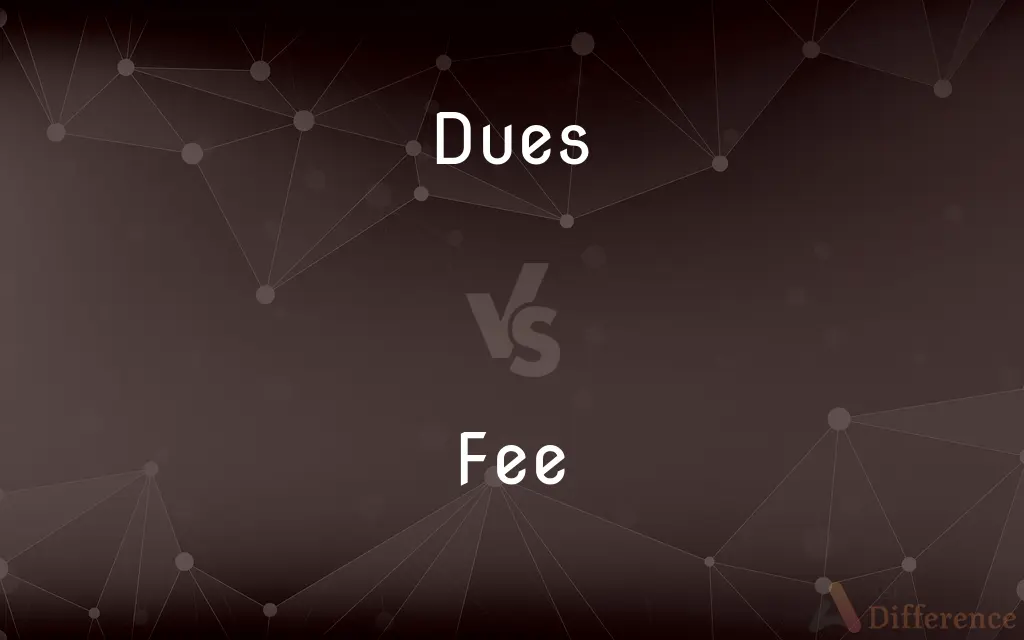Dues vs. Fee — What's the Difference?
Edited by Tayyaba Rehman — By Fiza Rafique — Updated on March 29, 2024
Dues are regular payments made to an organization by its members, while a fee is a charge for a specific service or privilege.

Difference Between Dues and Fee
Table of Contents
ADVERTISEMENT
Key Differences
Dues are often associated with membership in clubs, unions, or associations, where the payment is recurrent, typically monthly or annually, to maintain membership status. Whereas, fees are usually one-time or per-use charges for services or privileges, such as entry fees to parks, legal filing fees, or school tuition.
Dues are generally fixed and predetermined by the organization, providing members with access to a broad range of benefits, including resources, facilities, and support services. On the other hand, fees can vary widely depending on the service provided, the provider's qualifications, or the facility's location.
While dues help in creating a sense of community and belonging among members by contributing to a common fund, fees are transactional, often required for specific, sometimes optional, activities or services.
Organizations rely on dues for steady revenue to fund operations, events, and member services, illustrating a model of collective support. Fees, however, are typically earmarked for direct costs associated with providing a specific service or access, reflecting a direct exchange of value.
Dues are not always mandatory for all members of an organization, as there may be different tiers of membership with varying benefits. Fees, in contrast, are usually non-negotiable and must be paid to access a particular service or facility.
ADVERTISEMENT
Comparison Chart
Nature
Recurrent payments
One-time or per-use charges
Purpose
Maintain membership status and access benefits
Access specific services or privileges
Variability
Generally fixed and predetermined
Can vary widely based on service or qualification
Revenue Use
Fund operations, events, and member services
Cover direct costs of providing a specific service
Membership
Implies belonging to an organization
No membership implication; transactional
Compare with Definitions
Dues
Regular payments made by members of an organization.
The annual dues for the club are $100.
Fee
Tuition for education or training.
The college's annual fee includes library access.
Dues
Financial obligations to a group or community.
As a union member, he ensures his dues are never late.
Fee
Administrative costs for processing.
The application fee covers the cost of document review.
Dues
Contributions to maintain membership benefits.
Paying my dues on time gives me access to all the facilities.
Fee
Payment required to access a facility.
The park's camping fee is payable upon entry.
Dues
A form of subscription to belong to an entity.
The monthly dues include access to online resources.
Fee
A charge for professional services.
Lawyer fees can be substantial depending on the case complexity.
Dues
Recurrent financial support to an organization.
Her dues support the nonprofit's mission.
Fee
A charge for a specific service or privilege.
The entrance fee for the museum is $20.
Dues
Payable immediately or on demand.
Fee
A fee is the price one pays as remuneration for rights or services. Fees usually allow for overhead, wages, costs, and markup.
Dues
Owed as a debt; owing
The amount still due.
Fee
A fixed sum charged, as by an institution or by law, for a privilege
A license fee.
Tuition fees.
Dues
In accord with right, convention, or courtesy; appropriate
Due esteem.
All due respect.
Fee
A charge for professional services
A surgeon's fee.
Dues
Meeting special requirements; sufficient
We have due cause to honor them.
Fee
A tip; a gratuity.
Dues
Expected or scheduled, especially appointed to arrive
Their plane is due in 15 minutes.
Fee
(Law) See fee simple.
Dues
Expected to give birth.
Fee
In feudal law, an estate in land granted by a lord to his vassal on condition of homage and service. Also called feud2, fief.
Dues
Anticipated; looked for
A long due promotion.
Fee
The land so held.
Dues
Expecting or ready for something as part of a normal course or sequence
We're due for some rain. This batter is due for another hit.
Fee
To give a tip to.
Dues
Entitled to
I always give people the respect that they are due.
Fee
(Scots) To hire.
Dues
Capable of being attributed. See Usage Note at due to.
Fee
(feudal law) A right to the use of a superior's land, as a stipend for services to be performed; also, the land so held; a fief.
Dues
Something owed or deserved
You finally received your due.
Fee
(legal) An inheritable estate in land held of a feudal lord on condition of the performing of certain services.
Dues
Dues A charge or fee for membership, as in a club or organization.
Fee
(legal) An estate of inheritance in land, either absolute and without limitation to any particular class of heirs (fee simple) or limited to a particular class of heirs (fee tail).
Dues
Straight; directly
Go due west.
Fee
(obsolete) Property; owndom; estate.
Dues
(Archaic) Duly.
Fee
(obsolete) Money paid or bestowed; payment; emolument.
Dues
Plural of due
Fee
(obsolete) A prize or reward. Only used in the set phrase "A finder's fee" in Modern English.
Dues
Membership fees.
Fee
An additional monetary payment charged for a service or good that is minor compared to the underlying cost.
Fee
To reward for services performed, or to be performed; to recompense; to hire or keep in hire; hence, to bribe.
Fee
Property; possession; tenure.
Once did she hold the gorgeous East in fee.
Fee
Reward or compensation for services rendered or to be rendered; especially, payment for professional services, of optional amount, or fixed by custom or laws; charge; pay; perquisite; as, the fees of lawyers and physicians; the fees of office; clerk's fees; sheriff's fees; marriage fees, etc.
To plead for love deserves more fee than hate.
Fee
A right to the use of a superior's land, as a stipend for services to be performed; also, the land so held; a fief.
Fee
An estate of inheritance supposed to be held either mediately or immediately from the sovereign, and absolutely vested in the owner.
Fee
An estate of inheritance belonging to the owner, and transmissible to his heirs, absolutely and simply, without condition attached to the tenure.
Buy the fee simple of my life for an hour and a quarter.
Fee
To reward for services performed, or to be performed; to recompense; to hire or keep in hire; hence, to bribe.
The patient . . . fees the doctor.
There's not a one of them but in his houseI keep a servant feed.
Fee
A fixed charge for a privilege or for professional services
Fee
An interest in land capable of being inherited
Fee
Give a tip or gratuity to in return for a service, beyond the agreed-on compensation;
Remember to tip the waiter
Fee the steward
Common Curiosities
How are dues different from fees?
Dues are recurrent payments for membership benefits, while fees are charges for specific services or privileges.
Are dues mandatory for all members of an organization?
Not always; some organizations have different membership tiers with varying dues.
Are fees considered a form of taxation?
No, fees are charges for specific services or privileges, not taxes collected by governments.
What happens if dues are not paid?
Members may lose access to benefits or membership status if dues are not paid.
What is a fee?
A fee is a charge for a specific service or privilege, often one-time or per-use.
Is a fee refundable?
Fees are usually non-refundable, especially if they cover the cost of a provided service.
How do organizations use the dues collected?
Organizations use dues to fund operations, events, and services for members.
What are dues?
Dues are regular payments made to an organization by its members to maintain their membership and access benefits.
Can fees vary?
Yes, fees can vary widely depending on the service, provider's qualifications, or location.
Can the amount of a fee be negotiated?
In some cases, fees for services, like professional fees, may be negotiable.
Do dues provide access to benefits?
Yes, paying dues often gives members access to a range of benefits offered by the organization.
Do dues and fees apply to online services as well?
Yes, both dues and fees can apply to online services and memberships.
Can one be a member of an organization without paying dues?
Some organizations may offer honorary or special memberships without dues, but this is not common.
Why are fees important for services?
Fees are important as they cover the direct costs associated with providing a specific service.
Do dues contribute to the community aspect of an organization?
Yes, dues help create a sense of community among members by supporting common goals and activities.
Share Your Discovery

Previous Comparison
Revise vs. Review
Next Comparison
Priest vs. CurateAuthor Spotlight
Written by
Fiza RafiqueFiza Rafique is a skilled content writer at AskDifference.com, where she meticulously refines and enhances written pieces. Drawing from her vast editorial expertise, Fiza ensures clarity, accuracy, and precision in every article. Passionate about language, she continually seeks to elevate the quality of content for readers worldwide.
Edited by
Tayyaba RehmanTayyaba Rehman is a distinguished writer, currently serving as a primary contributor to askdifference.com. As a researcher in semantics and etymology, Tayyaba's passion for the complexity of languages and their distinctions has found a perfect home on the platform. Tayyaba delves into the intricacies of language, distinguishing between commonly confused words and phrases, thereby providing clarity for readers worldwide.














































